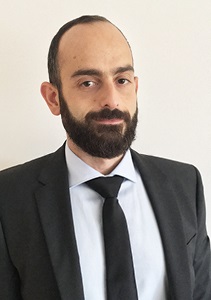 Tell us about your career path since graduation.
Tell us about your career path since graduation.
After I graduated, I worked on a couple of short-term commercial contracts researching acoustic insulation on high speed trains and aircraft.
I then studied for my PhD. When that was completed, I worked for several years as a Postdoctoral Researcher on three different projects at the University of Bristol. The first was about non-linear vibrations and how changes in resonant frequencies can increase stress on materials and therefore risk to structures.
The second project explored vibration energy harvesting, and spanned both the US and UK. Our working principle was that some of the harvested energy could be used to control the vibration absorbers. For this project, I supervised a number of students and managed the project finances.
The third project, which is still ongoing, investigates non-linearities in engineering - like gears, friction, composite materials, and musical instruments. It’s a huge body of work involving some major companies, including Augusta Westland, EDF, and Rolls-Royce, but also a number of universities – Bristol, Cambridge, Swansea, Sheffield and Southampton.
While I’m still an external collaborator on the project, I now lecture on Mechanical Engineering at the University of Glasgow.
What does your current role entail?
There are three elements to my role; teaching, research, and administration. For the teaching role, I’m responsible for the dynamics teaching thread, ensuring our curriculum is as comprehensive as it should be.
Alongside that, I manage four main topics of research; non-linear dynamics, instability in combustion chambers, numerical methods for non-linear systems in general, and semi-analytical methods for orbital propagation.
Last but not least, I promote mechanical engineering at the University open days.
Tell us about your most interesting career experience to date.
A definite highlight has been my experience of passive electrical fusing of oscillators. When I was studying energy harvesting, I determined that when you couple an oscillator with an electrical field, you can use resistors and capacitors to tune an oscillator to the frequency of oscillation. It has been great to develop an entirely new technology, see it used widely, and have journals published on the subject.
Why did you decide to become an Associate Member of the Institution?
I think there’s something special about the passing of knowledge to the next generation, and the Institution is effectively there to do that. Being a member of the Institution also shows that I have a real connection to the engineering world, which is valuable to me.
Why did you decide to become professionally registered?
Becoming Chartered is an important step in the life of an engineer. I see it as a mark of my engineering ability and credentials. There’s a tendency for academics to be seen as detached from industry and real life problems. Professional registration can therefore be a very good way of proving that’s not the case, while also showing that you’re committed to something that will pay back to society.
How long did it take you to achieve?
I achieved Chartered status in the UK very recently, although I was already Chartered in Italy. The procedure in Italy is very different than in the UK. You go through an exam to get Chartered – it is less related to your experience, and more related to what you have studied, so you can do it straight after you get your degree.
My feeling is that experience is much more valued in the UK. To achieve professional registration, you need to show that you have grown as an engineer and that you’ve met certain development goals.
What was your experience of the Professional Review interview?
The Professional Review interview was actually one of the best experiences of my life. When you’re a lecturer you work hard on many different projects. It’s very rare that you get the opportunity to talk in depth about what you have done, so it was a real pleasure to pause and share my experiences and achievements with people who have the same passion for engineering.
How has professional registration benefitted you?
Professional registration has helped with the outreach for my research. When it’s complete, I’ll be organising a seminar at IMechE to share the key findings with the engineering community. Doing this can be a strong selling point for the Engineering and Physical Sciences Research Council, the organisation that will be reviewing the research proposal.
Being Chartered will also be useful when I speak to potential collaborators. People from industry tend to have a different perception of you if you are a Chartered engineer. It helps to set the tone of the collaboration.
Besides, while I’m very happy with my job today as an academic, I may want to go into industry at some point in the future – and having Chartered status will certainly help with that. It just opens up possibilities for you.